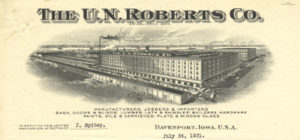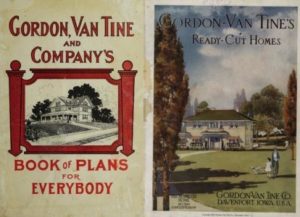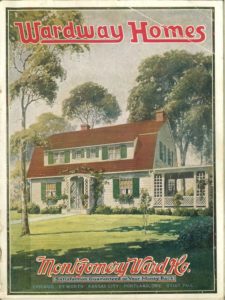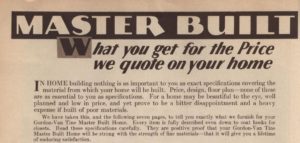 Kit Houses
Kit Houses
Gordon-Van Tine Block 1
 What better way to learn about a business than supplying it with materials for its product? Such was the case with the Gordon-Van Tine Company, incorporated in 1907 as a subsidiary of the U.N. Roberts Lumber Company in Davenport, Iowa. The company, which took its name from stockholders Horace Gordon Robinson and Harry Van Tine Scott, was a supplier for Sears, Roebuck & Company from 1907 to 1912.
What better way to learn about a business than supplying it with materials for its product? Such was the case with the Gordon-Van Tine Company, incorporated in 1907 as a subsidiary of the U.N. Roberts Lumber Company in Davenport, Iowa. The company, which took its name from stockholders Horace Gordon Robinson and Harry Van Tine Scott, was a supplier for Sears, Roebuck & Company from 1907 to 1912.
Gordon-Van Tine published its first Book of Plans for Everybody in 1907 but didn’t launch its prefabricated line of “Ready Built” houses until 1916. It continued to sell building materials during this time.

In 1917, the company began fabricating Montgomery Ward’s “Wardway” houses, adding design of the homes in 1921. Throughout this period, it produced its own homes, as well, leading to many near-identical designs. Montgomery-Ward terminated its kit house division during the Great Depression, delivering a financial blow to Gordon-Van Tine.

Gordon-Van Tine began to offer in-house mortgages in 1924 to attract customers. The mortgage program ended in 1931, a casualty of the Great Depression. With their Montgomery-Ward partnership lost, their mortgage program ending, and the American public suffering from the effects of the Great Depression, Gordon-Van Tine sought to attract new business by offering a line of custom-designed Master Built homes beginning in 1932. Compared to their low-cost Standard-Bilt homes, these had more options to upgrade materials, fixtures, and design.

Any new business generated by the Master Built line was insufficient to weather the Great Depression or the material shortage created by World War II. The kit house operations ceased during World War II, and the U.N.Roberts/Gordon-Van Tine concern closed completely in 1947.